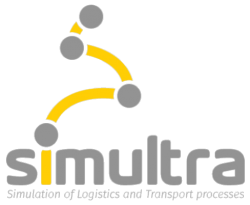Supply chain simulation in the classroom.
What is the Simultra project?
Financed by the European Union's Erasmus + programme, the SIMULTRA project complies with national and European vocational Training strategies (FP), improving the ' dual system ' through closer collaboration between the business system and the Education, and expanding the use of a work-based learning approach. It should be taken into account that the 7 partners of the project are a research institute (ITL-IT), a training centre (CIFPA – ES), a university (Antwerp – BE), a company (Interporto di Parma – IT), a sectoral association (AFT – FR), and two technology companies and co Munication (Poliedra – IT, NOVADEVS – EN). On the other hand, there are more than 10 organizations (companies, schools, public authorities) that have already approved their support for the project.
What does the project intend to do?
Despite its former military origin, only today logistics (the sector approached by this project) has been recognized as a fundamental element for business competitiveness, but also as a pillar for economic, environmental and social sustainability, and its Introduction into the education and training system is in some recent way, therefore to be improved. For this reason, the project aims to carry out six simulation tools, addressing the main sectoral areas, which replicate the operational procedures of these areas, in order to enable students and apprentices to carry out the Practical, typical and daily tasks that will have to be implemented at work.
What About your goals?
The main objective is, of course, to facilitate the labour insertion of these medium-high qualified professional profiles (level 4 and 5 EQF in particular), reducing the gap between training and education, with their more traditional and theoretical methodologies, and Practical business operation. The tools will be carried out in close collaboration with the operating and operational contexts that will be replicated. The products will be the complementary element of the current courses of training of FP and will benefit from the attraction that such ICT tools have with respect to the younger generations, since they will be realized like videogames with different scenarios, Scores and scenarios, coinciding with today's uses and technologies, especially for youth.
How will it be done?
As mentioned, the tools will be referred to six fields of activity (and six professional profiles linked to these fields) which are highly relevant to the sector: Supply chain management, intermodal transport, maritime transport and Port activities, customs procedures, road transport, warehouse management. For each of these fields, processes will be described, together with operations, time scheduling, other stakeholders, tools and documents available and to be used. The objective is to design simulation tools or interactive software that replicate the main task carried out by the professionals of the sector.
In particular, it will be carried out: an interactive tool for calculating all the costs related to the logistic and transport chain, a warehouse management software (WMS) for the training objectives, a simulator for the operative management of a Intermodal terminal, an interactive tool for calculating costs of maritime activities and planning infrastructure and equipment, a simulated role-playing game for the management of customs practices and a simulator for monitoring the Road transport missions. These applications represent the entire supply chain related to a container that from an extra-EU country is sent to an EU customer, so its use allows to provide a comprehensive vision of the sector and its main subsectors.
What else?
The tools will be tested during the project through the wide participation of teachers and students, and only after the detection of the satisfaction of the users, as well as the quality of the learning, will be finished.
A specific technical and formative documentation Will BE prepared to support the use: a user manual for the operation, manuals on technical contents and knowledge related to the simulated procedures, professional competencies (according to the European System of Credit for Vocational Training) and Educational Standards for inclusion in training courses and transparency of learning outcomes.
The expected impacts refer to a greater operational capacity of the learners, to facilitate labour insertion, making training more attractive for the sector, thanks also to an innovative and quality methodology that merges the competencies of Training with the commercial operations, which may be complementary to current and future courses. The launching of a collaboration between schools and companies will allow the creation of new initiatives, but also a possible extension of the results of the project (parameters, stages of the simulators).
Project Partners
ITL – Institute of transport and logistics Foundation (Italy) – Coordinator
CePIM – Interporto di Parma (Italy)
POLIEDRA (Italy)
University of Antwerp (Belgium)
CIFPA-Innovation Centre for Vocational Training in Aragon (Spain)
AFT – Association for the development of vocational training in transport (France)
NOVADEVS (Spain)
Project Duration: 2 years (1 October 2017 – 30 September 2019)
WMS didactic Software developed by CIFPA
The objective is to develop didactic simulation software related to the implementation of warehouse management procedures. It will Deal with the following aspects:
- Merchandise Entry Processing
- Selection of maintenance and transport elements
- Selection of locations
- Receipt and registration of goods (Labelling and coding)
- Storage
- Movement of materials between locations
- Distribution of goods
- Stock Management
- Inventory Control
- Document Management of suppliers, goods and clients
- Process Statistics.
Similar procedures Will Be developed for the output of warehouse products.






